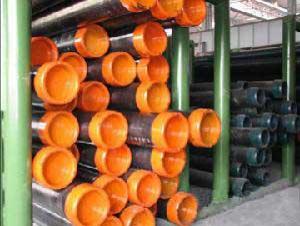OCGT PIPE
- Loading Port:
- Tianjin
- Payment Terms:
- TT OR LC
- Min Order Qty:
- -
- Supply Capability:
- 20000ton m.t./month
OKorder Service Pledge
OKorder Financial Service
You Might Also Like
OCGT PIPE
API 5CT L80-1(L809Cr,L8013Cr) OIL FIELD CASING PIPE
We have the ability to detect the whole process. We can fully guarantee the high quality of the products.The API 5CT L80 oilfield casing pipe be made of three Grades,including L80-1 ,L80 9 Cr ,L80 13Cr. these three Grades keep the consistent mechanical properties,but different heat treatment method and chemical composition.
It is well known that oil casing is the important lifeline for maintaining oil wells’ operation. But geographical environment is totally different in different areas and the connection of underground force is very complex. A variety of forces acting on the pipeline together, for example: tension, pressure, bending and twisting stress, all of which require oil casing should reach a higher level of quality. Oil casing’s damage for some reason will cause the oil wells’ production decline; some time seriously it will make well abandonment. So our company produces L80 steel grade oil casing strictly according to the API 5 CT standards.
Product Specification
Material | L80-1、L80-9Gr、L80-13Gr |
External thickness | “4 1/2- 20”inch, (114.30- 508.00 mm) |
Wall thickness | 5.21-16.13 mm |
Thread form | buttress casing, long casing, short casing |
Function | used for protecting pipeline |
L80 Chemical Composition
Steel grade | Type | C | Mn | Mo | Gr | Ni | Cu | P | S | Si | ||||
min | max | min | max | min | max | min | max | max | max | max | max | max | ||
L-80 | 1 |
| 0.43 |
| 1.90 |
|
|
|
| 0.25 | 0.35 | 0.030 | 0.030 | 0.45 |
L-80 | 9Gr |
| 0.15 | 0.30 | 0.60 | 0.90 | 1.10 | 8.00 | 10.0 | 0.50 | 0.25 | 0.020 | 0.010 | 1.00 |
L-80 | 13Gr | 0.15 | 0.22 | 0.25 | 1.00 |
|
| 12.0 | 14.0 | 0.50 | 0.25 | 0.020 | 0.010 | 1.00 |
.
Length:
R1-(6.10m~7.32m),R2-(7.62/8.53)~10.36m,R3-(10.36/10.97~14.63m)
Certificate:
API 5CT,Russian Certificate,ISO,CCS
Packing:
Coating and steel thread protector
Usage:
The API 5CT L80 oilfield casing pipe is an advanced type in the process of oil drilling.the mechanical performance is higher than the casing made of J55,N80. with relatively hight price,the product applies to more complicated geological conditions,and runs down deeper into the well. in the exploitation of oil and gas,the use of L80 is less frequent than J55,N80 and other Grades..
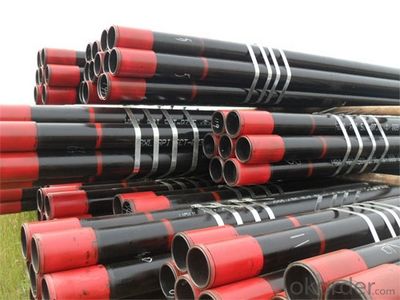
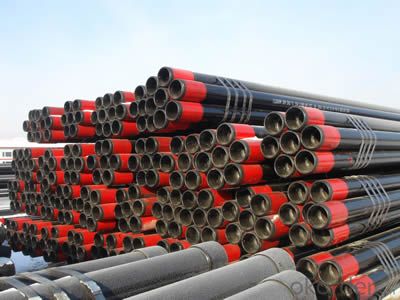
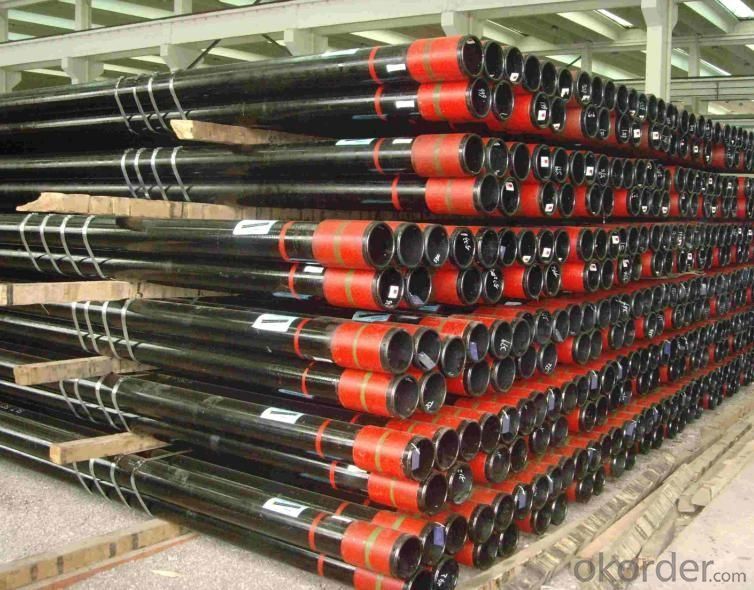
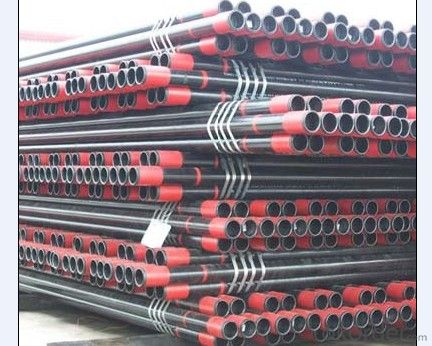
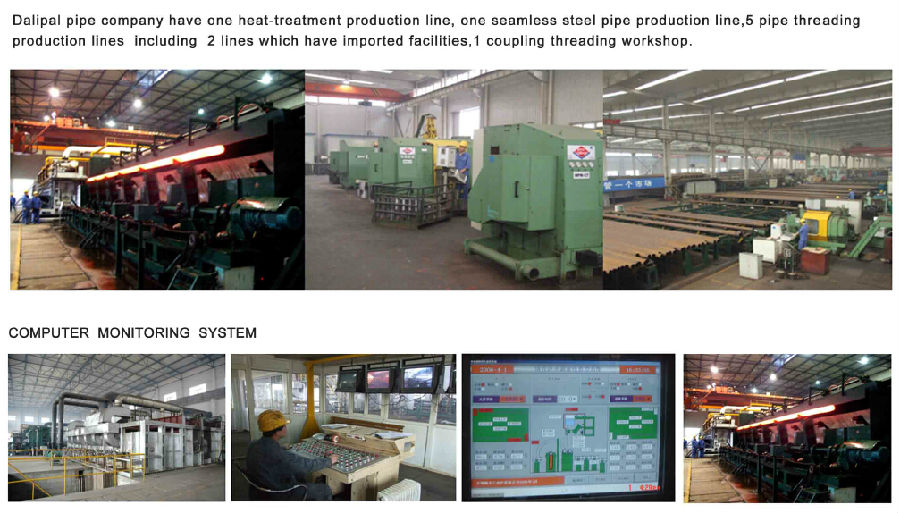
- Q:What are the different methods of repairing damaged steel pipes?
- There are several methods for repairing damaged steel pipes, including welding, epoxy coatings, pipe wrapping, and pipe lining. Welding involves fusing the damaged sections of the pipe using heat and specialized equipment. Epoxy coatings are applied to the damaged area to create a protective layer and restore the pipe's integrity. Pipe wrapping involves applying specialized tapes or wraps around the damaged area to provide structural support. Pipe lining involves inserting a new pipe into the damaged one, creating a seamless and durable solution. The appropriate method depends on the extent and location of the damage, as well as other factors such as cost and time constraints.
- Q:How do you calculate the thermal expansion of steel pipes?
- To calculate the thermal expansion of steel pipes, you need to know the coefficient of thermal expansion (CTE) of the specific type of steel used. This value represents how much the steel material expands or contracts per unit length with each degree of temperature change. Once you have the CTE, you can multiply it by the initial length of the steel pipe and the temperature change to determine the thermal expansion. The formula is: Thermal Expansion = CTE x Initial Length x Temperature Change.
- Q:What are the common applications of steel pipes in industrial settings?
- Steel pipes have a wide range of applications in industrial settings, including but not limited to, the transportation of fluids and gases, structural supports in buildings and infrastructure, manufacturing of machinery and equipment, and even in the oil and gas industry for drilling and extraction purposes.
- Q:Can steel pipes be used in plumbing systems?
- Yes, steel pipes can be used in plumbing systems. Steel pipes are commonly used for plumbing due to their durability, strength, and resistance to corrosion. They are suitable for both residential and commercial plumbing applications and can effectively transport water, gas, and other fluids.
- Q:How are steel pipes classified according to their use?
- Steel pipes can be classified according to their use into various categories such as structural pipes, plumbing pipes, oil and gas pipes, and industrial pipes.
- Q:Can steel pipes be used for transportation of hazardous materials?
- Yes, steel pipes can be used for the transportation of hazardous materials. Steel pipes are commonly used for transporting various types of hazardous materials such as chemicals, gases, and liquids. They are known for their strength, durability, and resistance to corrosion, making them suitable for safely transporting these materials over long distances. Additionally, steel pipes can be designed to meet specific safety standards and regulations to ensure the secure transportation of hazardous substances.
- Q:How do steel pipes perform in earthquake-prone regions?
- Steel pipes perform well in earthquake-prone regions due to their high strength and ductility. They are capable of flexing and absorbing seismic energy, reducing the risk of catastrophic failure. Additionally, steel pipes can be designed with proper reinforcement to withstand ground movements, making them a reliable choice for infrastructure in earthquake-prone areas.
- Q:How are steel pipes protected against external corrosion in coastal areas?
- To safeguard steel pipes against external corrosion in coastal regions, a combination of coating and cathodic protection methods is employed. An effective approach involves applying a protective coating onto the steel surface, forming a barrier against corrosive elements like saltwater and humidity present in the coastal environment. Commonly used coating materials, such as epoxy or polyethylene, possess corrosion-resistant properties and offer long-lasting protection. Furthermore, cathodic protection is utilized to enhance the corrosion resistance of the steel pipes. This technique employs sacrificial anodes or impressed current to prevent corrosion. Sacrificial anodes, typically made of zinc or aluminum, are attached to the steel pipe and corrode in place of the steel, sacrificing themselves to safeguard the steel surface. On the other hand, impressed current systems rely on an external power source to provide a protective current, effectively preventing corrosion. Ensuring the effectiveness of the protective coating and cathodic protection system necessitates regular inspection and maintenance. Coatings may degrade over time due to wear and tear, requiring periodic evaluation and reapplication if necessary. Similarly, sacrificial anodes must be replaced when depleted, and impressed current systems need to be monitored and adjusted to maintain the desired level of protection. By combining the application of durable coatings with cathodic protection measures, steel pipes in coastal areas can be adequately shielded against external corrosion, promoting their durability and optimal performance.
- Q:How are steel pipes used in the construction of irrigation systems?
- Steel pipes are commonly used in the construction of irrigation systems to transport water from a source, such as a reservoir or well, to the fields or gardens that need to be irrigated. These pipes are durable, strong, and resistant to corrosion, making them ideal for withstanding the pressure and frequent water flow in irrigation systems. They are often used to create mainlines, secondary lines, and lateral lines, ensuring the efficient distribution of water to different areas. Additionally, steel pipes can be easily connected and adapted to various configurations, allowing for flexibility in designing and expanding irrigation networks.
- Q:How are steel pipes protected against rusting?
- Steel pipes are protected against rusting through various methods such as galvanization, applying protective coatings, or utilizing corrosion-resistant alloys.
1. Manufacturer Overview |
|
|---|---|
| Location | |
| Year Established | |
| Annual Output Value | |
| Main Markets | |
| Company Certifications | |
2. Manufacturer Certificates |
|
|---|---|
| a) Certification Name | |
| Range | |
| Reference | |
| Validity Period | |
3. Manufacturer Capability |
|
|---|---|
| a)Trade Capacity | |
| Nearest Port | |
| Export Percentage | |
| No.of Employees in Trade Department | |
| Language Spoken: | |
| b)Factory Information | |
| Factory Size: | |
| No. of Production Lines | |
| Contract Manufacturing | |
| Product Price Range | |
Send your message to us
OCGT PIPE
- Loading Port:
- Tianjin
- Payment Terms:
- TT OR LC
- Min Order Qty:
- -
- Supply Capability:
- 20000ton m.t./month
OKorder Service Pledge
OKorder Financial Service
Similar products
New products
Hot products
Related keywords
